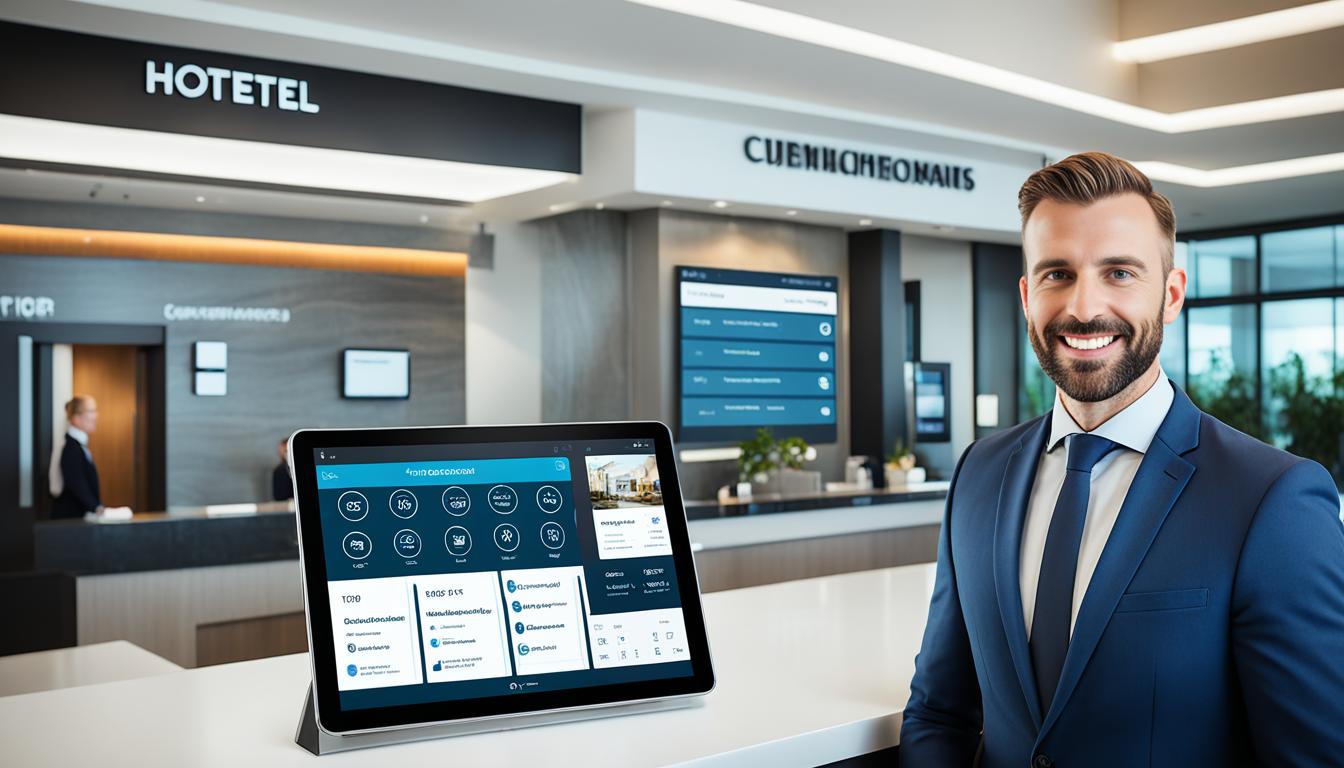Voice search has revolutionized the way people interact with technology, and its impact on hotel SEO cannot be ignored. As more and more users turn to voice assistants like Siri, Alexa, and Google Assistant for their search queries, it is essential for hotels to adapt their SEO strategies to stay competitive in the evolving digital landscape.
In this article, we will explore the concept of voice search and its increasing popularity among users. We will discuss how voice search differs from traditional text-based search and the implications it has for hotel SEO. Understanding the nuances of voice search is crucial for hoteliers to effectively optimize their online presence and drive more organic traffic to their websites.
One key aspect of adapting your hotel’s SEO strategy is to focus on creating a user-friendly and optimized website. A well-designed hotel website not only enhances the user experience but also improves its visibility on search engines. To assist hotels in this endeavor, PlanetHMS offers top-notch hotel website builder software and services.
Implementing voice search optimization strategies is another essential step in staying ahead in the competitive hotel industry. We will delve into practical tactics such as using conversational keywords, implementing structured data markup, optimizing for mobile devices, and leveraging local SEO to enhance your hotel’s visibility in voice search results.
In conclusion, the rising prominence of voice search necessitates a strategic adaptation of hotel SEO. By understanding voice search, optimizing your hotel’s website, and implementing voice search optimization strategies, you can ensure that your hotel remains visible and competitive in the ever-changing digital landscape.
For further inquiries or assistance in navigating the changing landscape of hotel SEO, reach out to [email protected]. Our expert team is ready to help you adapt your SEO strategy and drive more organic traffic to your hotel website.
Understanding Voice Search: A Game-Changer for Hotel SEO
In today’s digital landscape, voice search has emerged as a game-changer, transforming the way users interact with search engines. With the increasing popularity of voice assistants like Alexa, Siri, and Google Assistant, more and more people are opting for voice search to find information, make reservations, and explore new destinations.
So, what sets voice search apart from traditional text-based search? Unlike typing queries into a search bar, voice search relies on spoken language. Users can simply ask questions or give commands, and the voice assistant responds with relevant information. This natural and conversational approach to search queries has revolutionized user experiences.
The rise of voice search has significant implications for hotel SEO. Hoteliers must adapt their strategies to cater to the changing search behavior of users. It’s no longer enough to focus solely on traditional SEO techniques; hotel websites need to be optimized for voice search to stay competitive in the digital marketplace.
Optimizing for voice search involves understanding the nuances of how users phrase their queries. Voice search queries tend to be longer and more conversational in nature compared to text-based searches. Hoteliers need to identify and incorporate relevant conversational keywords into their website content to ensure maximum visibility in voice search results.
Another crucial aspect of voice search optimization is structured data markup. By implementing structured data markup, hotel websites can provide search engines with additional context and information about their content. This helps search engines better understand and categorize the website, increasing the chances of appearing in voice search results.
Mobile optimization is also pivotal in the age of voice search. With more users relying on smartphones and voice assistants, hotel websites must be responsive and mobile-friendly. A seamless mobile experience enhances user satisfaction and increases the likelihood of appearing in voice search results.
Moreover, local SEO plays a significant role in voice search optimization for hotels. Travelers often use voice search to find nearby accommodations, making local visibility essential. Hoteliers should focus on optimizing their Google My Business listing, ensuring accuracy and completeness of business information such as address, phone number, and ratings.
As voice search continues to gain momentum, hoteliers must prioritize adapting their SEO strategies. By understanding the unique characteristics of voice search and implementing optimization techniques, hotels can enhance their online presence, attract more guests, and stay ahead of their competitors.
Adapting Your Hotel Website: Leveraging Technology with PlanetHMS
In today’s digital landscape, having a user-friendly and optimized hotel website is essential for attracting potential guests and driving bookings. To achieve this, hotels need to leverage the right technology and tools that enable them to create a website that not only looks visually appealing but also performs well in terms of search engine optimization (SEO).
One such technology solution that can help hotels in achieving their website optimization goals is PlanetHMS. PlanetHMS is a leading hotel website builder software that provides a range of services to assist hotels in creating a SEO-friendly website.
The three key services offered by PlanetHMS are:
- Responsive Design: With mobile usage on the rise, it is crucial for hotels to have a website that is optimized for mobile devices. PlanetHMS offers responsive design templates that automatically adjust the layout and content of the website to provide an optimal browsing experience across different screen sizes.
- SEO Optimization: PlanetHMS understands the importance of SEO in driving organic traffic to a hotel website. Their platform provides built-in SEO tools and features, such as meta tags, keyword optimization, and XML sitemaps, to help hotels improve their search engine rankings and visibility.
- User-friendly Interface: PlanetHMS focuses on creating websites that are not only visually appealing but also easy to navigate for users. Their intuitive interface allows hotels to easily manage and update their website content, ensuring a seamless user experience.
By leveraging the technology and services offered by PlanetHMS, hotels can create a website that not only showcases their unique offerings but also ranks well in search engine results, ultimately driving more traffic and bookings.
Implementing Voice Search Optimization for Hotels
Optimizing your online presence for voice search is crucial for hotels looking to stay competitive in the digital landscape. By implementing practical tactics and strategies, hotels can enhance their visibility and improve their chances of being discovered by voice search users.
One key aspect of voice search optimization is incorporating conversational keywords into your hotel website’s content. Unlike traditional text-based searches, voice searches tend to use more natural language and longer phrases. By identifying and integrating these conversational keywords into your website’s copy, you can align your content with the way people speak and increase the likelihood of appearing in voice search results.
Another effective strategy is implementing structured data markup on your hotel website. Structured data helps search engines understand the context and information on your website, making it easier for them to provide relevant results to voice search queries. By using schema markup to mark up key details such as hotel location, amenities, and reviews, you can improve the chances of your hotel appearing in voice search results with rich and accurate information.
Mobile optimization is also essential when it comes to voice search. Many voice searches are conducted on mobile devices, so it’s crucial that your hotel website is optimized for mobile viewing and navigation. Ensure that your website is responsive, loads quickly, and offers a seamless mobile user experience. This will not only improve your chances of appearing in voice search results but also provide a positive experience for potential guests who visit your website via mobile devices.
Furthermore, local SEO plays a significant role in voice search optimization for hotels. Voice searches often include location-specific queries such as “hotels near me” or “best hotels in [city].” By optimizing your website for local SEO, including local keywords, claiming your Google My Business listing, and obtaining positive reviews from guests, you can increase your hotel’s visibility in voice search results and attract potential guests who are looking for accommodations in your area.
In conclusion, to effectively adapt to the rise of voice search and optimize your hotel’s online presence, it’s essential to incorporate conversational keywords, implement structured data markup, optimize your website for mobile devices, and focus on local SEO. By embracing these strategies, hotels can enhance their visibility in voice search results and stay ahead of the competition in the evolving digital landscape.
Conclusion
As voice search continues to revolutionize the way people search for information, it has become clear that hotels need to adapt their SEO strategies to remain competitive in the digital landscape. The rise in voice assistants like Siri, Alexa, and Google Assistant means that users are now searching for hotels and making reservations using voice commands.
To stay ahead of the game, hotels must prioritize optimizing their online presence for voice search. This involves embracing conversational keywords and implementing structured data markup to enhance the visibility of their website in voice search results. Additionally, mobile optimization becomes crucial as voice search is often performed on smartphones and other mobile devices. By ensuring a seamless and user-friendly experience across all devices, hotels can capture the attention of potential guests.
Furthermore, local SEO plays a significant role in voice search. With users frequently asking for recommendations near their location, hotels can leverage this by optimizing their website and online listings with relevant local information. This can significantly improve their visibility in voice search results and increase their chances of attracting local guests.
Adapting your hotel SEO strategy to voice search is no longer optional. It is a necessity for hotels to stay relevant and remain visible to potential customers. By embracing the opportunities presented by voice search and employing the tactics discussed in this article, hotels can position themselves at the forefront of the industry and ensure continued success in the ever-evolving world of digital marketing.







